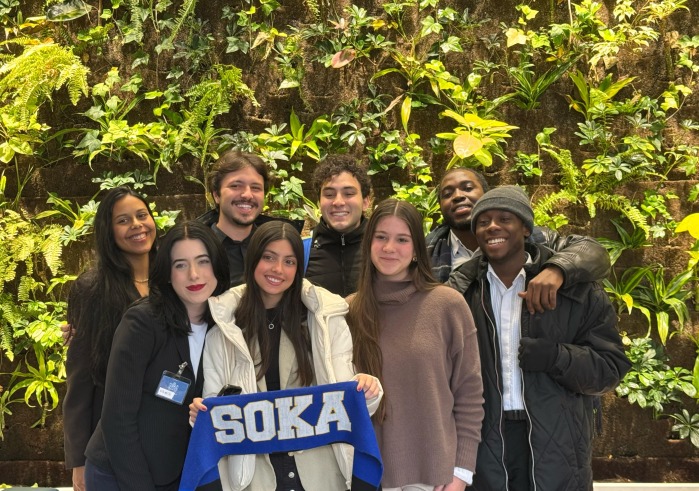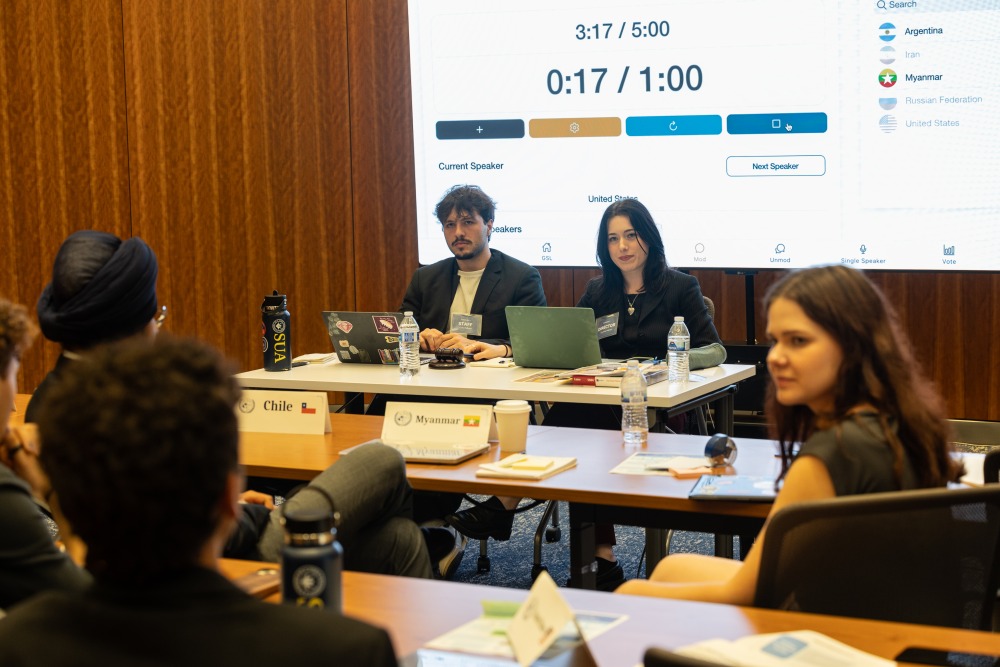“Our Voices Are Powerful”: Soka’s Model U.N. Team Shapes Informed and Eloquent Future Leaders

In a flurry of palpable joy and elation, SUA’s Model U.N. team accepted the “Best Small Delegation” award on Feb. 22 at the North American Model United Nations in Toronto, one of the most competitive conferences on the continent. Four Soka delegates also won individual awards: Renata Duarte Ferreira ’26 took home the “Book Award” for her position paper, and Carol Krein Robinson ’25, Anne Mirelle Ferreira Santos ’28, and Enyimpa Nkrumah ’27 each received the “Outstanding Delegate” award in their respective committees.
It has been an academic year full of accolades for the Soka delegation. Last November, at the Northwest Model United Nations in Seattle, Krein Robinson and Carlos Hoffmann ’27 won the “Position Paper Award,” and Krein Robinson also earned the “Outstanding Delegate” award. And at the end of March, the Model U.N. club organized the inaugural SUA Model U.N. conference, which was open to all Soka students, regardless of their level of experience with Model U.N.
But what does it take to succeed at a Model U.N. conference? According to club co-president Krein Robinson, delegates must not only be well informed on global issues, but also persuasive public speakers and quick-thinking, masterful debaters — skill sets that require a lot of dedicated practice.
The SUA Model U.N. team receives the “Best Small Delegation” award at NAMUN in Toronto.
Under the leadership of Krein Robinson and co-president Duarte Ferreira, the Model U.N. club began meeting weekly for training sessions that focus on each of the skills delegates need at a conference.
“For example,” Krein Robinson said, “we recently had a training session for opening speeches. We assigned everyone a country on the spot and gave them 20 minutes to prepare. They needed to have a good hook to catch people’s attention, then deliver their point, and finally do a call to action. At the end, everyone presented at the podium. It was really fun.”
Team training sessions might consist of writing clauses or preambles to resolutions, reviewing committee rules of procedure, or studying the background guides. The Model U.N. club also regularly discusses how to craft an effective position paper, a document that clearly lays out a delegate’s assigned country’s stance and goals related to the issue their designated committee is focusing on.
In their position paper and oral arguments, delegates must accurately represent the foreign policies and interests of their assigned countries, even when these do not align with their own political beliefs. This can be a rigorous exercise in critical thinking, interdisciplinary analysis, and imaginative empathy — all skills that are fundamental to the liberal arts education students receive at SUA.
“Through the interdisciplinary curriculum, I think Soka has helped us be very critical and analyze things from multiple perspectives,” Krein Robinson said.
Visiting Assistant Professor of Peace and Conflict Studies Tetsushi Ogata ’05, who is the faculty advisor for SUA’s team, says that the small classes and dialogic settings of Soka courses are “a great training ground” for students who are passionate about Model U.N. And when students nurture their skills as delegates, they often shine in classroom discussions as well.
“It creates a self-reinforcing pattern,” Ogata said. “Model U.N. provides a great additional opportunity for students to excel in a more accelerated way.”
Duarte Ferreira credits Model U.N. with helping her develop her debate skills and giving her hands-on experience in “approaching sensitive topics with equity and respect.”
Diplomacy also plays an important role in delegates’ success at a Model U.N. conference. Within their respective committees, delegates must not only advocate for their countries’ interests, but work together with representatives of other countries to devise creative solutions, identify potential compromises, and build consensus around a proposed resolution.
“You have to learn how to talk to people that hold very different opinions than you and try to compromise,” Krein Robinson said. “You have to be creative and think on your feet, pivoting or adapting if necessary. We become very resilient.”
Bridging divides and finding common ground offers delegates an immersive experience of the diplomatic challenges that real U.N. workers navigate regularly. It also helps them practice collaborative problem solving and develop interpersonal skills that are applicable across an array of professional settings.
The impact of student delegates can reach beyond the confines of the conference, Krein Robinson said. At Northwest Model United Nations last fall, conference staff member Kristina Mader, who frequently observes real committee sessions at the U.N. Headquarters in New York in her capacity as a senior program and research manager at the NGO Working Group on Women, Peace, and Security, told the Model U.N. delegates that their work is not only a model of the U.N., but for the U.N. According to Mader, real U.N. delegates sometimes take inspiration from the well-researched and carefully crafted resolutions that students pass.

Ogata hopes that the team develops a genuine sense of pride as SUA students through their experiences competing with peers from other universities.
“The ‘Best Small Delegation’ award is a testament to the inherent and learned qualities they have as Soka students,” he said. Ogata also hopes that the team’s success will increase awareness among SUA students of the wonderful opportunities Model U.N. provides, especially when they make a serious commitment to attending club meetings and sharpening their skills.
“I have much more confidence when speaking and much more knowledge of important issues happening around the world,” Duarte Ferrera said of the growth she has experienced participating in Model U.N. She also values how conferences give her a chance to network with peers from many different backgrounds. “We make so many new friends and meet people from everywhere,” she said. “It’s an amazing experience, and as a team, we create memories that will last forever.”
For her part, Krein Robinson gains an enduring sense of hope from watching her peers at Model U.N. conferences skillfully advocate for what they believe in, knowing that they often apply their capabilities and passion to tackling real-world issues.
“I’ve learned that there are many people who think alike and have the same values and goals,” she said. “We might have different opinions on certain topics, but ultimately, we all want to improve the world. We all want to address inequalities and fight for social justice. We might be a minority, but our voices are powerful, and we can influence policies.”
